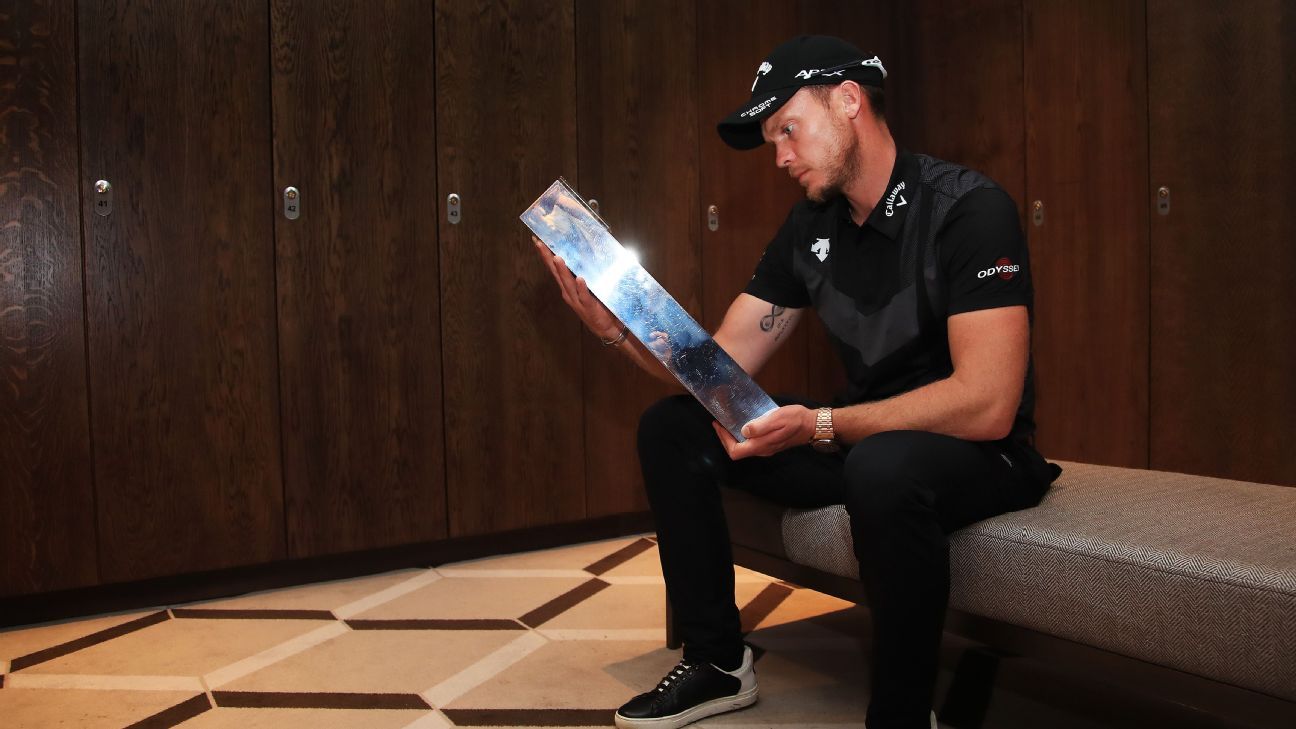Products You May Like
Danny Willett‘s final-round 67 is something he will long cherish. It is a scorecard to be framed, and obviously admired. No bogeys. Five birdies, including three over the stressful back nine. No slips under duress.
But this was not the 67 Willett shot on Sunday to win the BMW PGA Championship, the flagship tournament on the European Tour and his first professional victory in his native England.
Nope, we’re talking about Augusta National.
Remember the 2016 Masters?
Most think of Jordan Spieth‘s implosion, and understandably so.
Spieth had a 5-shot lead heading to the back nine and Willett was an afterthought. Then Spieth bogeyed the 10th and 11th holes, hit two balls in the water on the 12th, and suddenly Willett was gifted a green jacket.
A win is a win — and remember, Willett played near-flawless golf that day — but he had to deal with the stigma of being a “fluke,” which wasn’t helped when his game went missing in the aftermath.
Certainly he has company in that regard. Ask about Paul Lawrie‘s 1999 Open victory (he shot a final-round 67 and came from 10 back to force a playoff), and most of the conversation is about Jean Van de Velde‘s collapse.
Nick Faldo‘s 67 in winning the 1996 Masters is always married to Greg Norman blowing a 6-shot lead and shooting 78. What about Stewart Cink‘s Claret Jug at the expense of Tom Watson? Or Y.E. Yang winning the PGA over Tiger Woods?
Because of various issues, including injury, Willett, 31, had dropped to 462nd in the world following the BMW PGA at Wentworth in 2018, when the event was played in May.
But he has quickly climbed back, winning last fall in Dubai and now again in another prestigious event, settling in at 31st in the world.
“It’s more being able to compete under the pressure with everything that’s happened,” said Willett, who was tied through 54 holes with Jon Rahm. “That self-belief in what you’re doing; the inner stuff that you say to yourself, the things that people don’t see on the outside, the hours you put in, what you’ve got to do and what you’ve got to sacrifice.
“For me, when the golf was real bad, and I didn’t really fancy playing it, to be able to then come down the stretch today and enjoy it is — it’s a real beautiful thing to be able to do because at the end of the day when I was 10, that’s what I took up golf for, because I enjoyed it and I wanted to get better.”
Holding off Rahm was impressive in its own right. The Spaniard has been one of the best in the world in recent months, with a run of six top-5 finishes, including a victory at the Irish Open, and nothing worse than a tie for 13th over his past nine worldwide starts.
But overcoming his own demons was likely far more difficult for Willett, who was ninth in the world following his Masters victory.
Willett had some decent results the rest of that year, but was not a factor in any of the major championships and had a horrific Ryder Cup, during which a column written by his brother P.J. that criticized American Ryder Cup fans — and was meant to be tongue in cheek — went viral, causing the golfer all kinds of grief.
The pain would only get worse as Willett dealt with shoulder, back, knee and wrist injuries and saw his game suffer. He missed the cut in his Masters defense, withdrew from the U.S. Open and missed the cut at the PGA Championship in 2017. Last year, he missed 13 cuts worldwide, including three of the four majors, before finally finding some form later in the year and capturing the European Tour’s season-ending event.
The improvement this year has been steady, but here he is back among the top 50 in the world after two years of struggle.
Europe’s Gain
One of the unintended benefits of the PGA Tour’s season concluding earlier is the boost it has given to a few events on the European Tour, including the BMW PGA Championship, which was wisely moved from its previous May date to September.
Always in a tough spot in May in and around a slew of PGA Tour events including the Players Championship and The Memorial, European Tour officials saw almost no choice but to switch the date when the PGA Championship moved into May.
The move was a good one, as several Americans, including Patrick Reed and Billy Horschel, took advantage, tying for fourth. Horschel even said he will recruit other Americans to join him next year.
“I’ll tell without being asked, I’ll tell them that this is a beautiful week and the course is unbelievable,” Horschel said. “The way the European Tour puts on a great event, the fans, everything that encompasses this event can rival the best of the best on the PGA Tour in my opinion.”
This week the tour heads north to Scotland for the Dunhill Links Championship, a pro-am at St. Andrews, Carnoustie and Kingsbarns in which Rory McIlroy will team with his father, Gerry.
The end of the PGA Tour season a month ago — and subsequent beginning of the fall schedule — has given some space and opportunity to those who play in Europe at a time when it otherwise might have been difficult.
McIlroy played in Switzerland last month, and Reed played at the European Open in Germany. Sergio Garcia won the KLM Open, which preceded the BMW, and in subsequent weeks we will see the Spanish Open, the Italian Open, the French Open and the Portugal Masters.
It certainly wasn’t the PGA Tour’s intention, but there’s seemingly nothing wrong with ceding some of the spotlight to Europe at a time when it is difficult to compete with other American sports interests.
Phil and Napa
It has been six weeks since Phil Mickelson had a lackluster finish to his PGA Tour season at the BMW Championship, where he said he’d be taking a lengthy break before assessing what was next. Don’t be surprised by his appearance at this week’s Safeway Open, which his management company runs and where Mickelson has played each of the past three years, including last year, the week after the Ryder Cup in France.
Mickelson said at the BMW that he would be playing this event, along with the CJ Cup in South Korea next month.
His chances of being one of Tiger Woods’ at-large selections for the Presidents Cup would seem to be remote, given Mickelson’s poor play since the Masters; his tie for 18th at Augusta was his best result in the past five months. But when asked whether he would consider being an assistant to Woods, Mickelson deflected by saying: “I need to decompress a little bit. I’m mentally fried and physically fried. I just need a little break before I kind of have some good thought plans for you.”
Mickelson later said he might add an event to try to gain Woods’ attention if he had some success in Napa and South Korea.
Short of that, Mickelson would miss his first U.S. team competition dating back to the 1994 Presidents Cup, where he made his debut. In 1993, Mickelson was a contender for an at-large pick on the last U.S. Ryder Cup team that won overseas but was not selected by captain Tom Watson. He has played on every Presidents Cup and Ryder Cup team since.
So if he’s not picked? Given Mickelson’s role as a member of the U.S. Ryder Cup committee — along with Woods and current U.S. Ryder Cup captain Steve Stricker — it would be extremely odd if he did not take part as an assistant captain in Australia.


